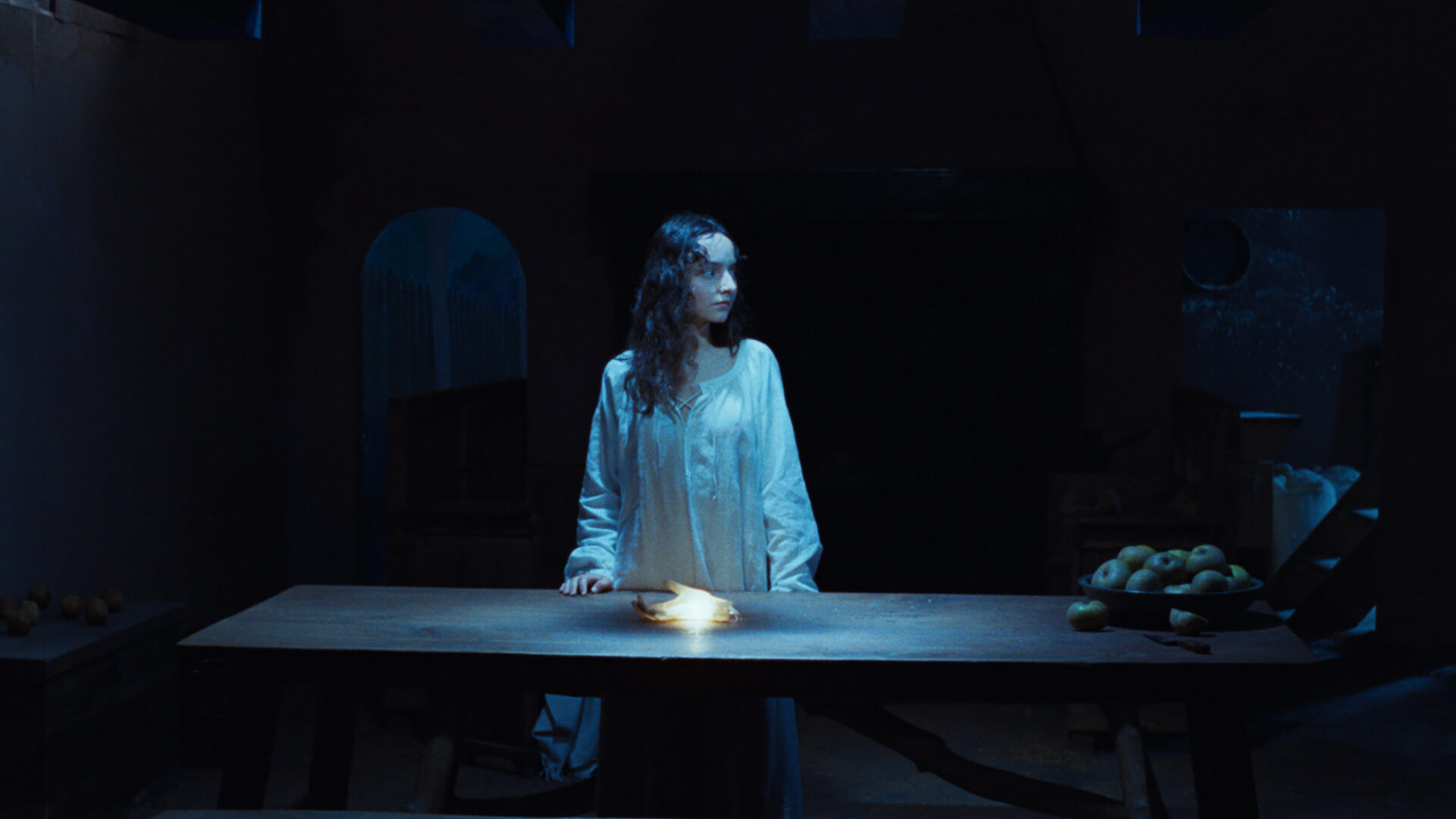November 27–December 9, 2025
Folk Tales & Divine Comedies: Films by João César Monteiro
“Next to Manoel de Oliveira, I believe that Monteiro was the leading filmmaker for my generation in Portugal.”
Miguel Gomes (Grand Tour, Tabu)
Every film by João César Monteiro (1939–2003) contains several acts of transformation. His work contains a kind of deviant magic, whether in his early career fairytale films or his later mode in which he appears as a libertine named after a saint, who practices a sort of sly, meditative sacrilege. This use of enticing artifice—visual and verbal—acts to unveil and combat the entropy of sickness, poverty, and other threats to life, a move that was motivated by the climate of his early artistic practice. Monteiro’s career flourished in the years immediately following the Carnation Revolution, an experience he helped document and never forgot, and near the end of his life he still spoke of cinema as an enriching means by which the dominant social order might be disturbed, even if its total subversion remained elusive.
A poet, film critic, actor, and fiercely committed public intellectual, Monteiro made adventurous and gorgeously photographed films that are widely recognized, within Portuguese cinema as well as the field of post-1968 “new wave” movements across the world, as uncommonly provocative and possessed by a searing sense of humour. His statements and ideas certainly land with iconoclastic emphasis; here you’ll find feminist fairytale heroes, dirty old men, ancient parables, and contemporary nightlife, which populate films that move at the pace of, at one moment, the glacial cosmic dance of planetary orbit, the next, a sudden strike between combatants.
It’s possible to take Monteiro’s cinema at face value, to see his political motivations, painterly compositions, or successfully underplayed comic gags as worthwhile for their own sake. But his slow-burn approach—every action carried out from beginning to end—makes for a seductive mixture of narrative directions. To watch a Monteiro film is to witness the way beauty and perversity, morality and hedonism, brutal violence and elegant wit, modernist dreams and ordered reality can be seen in oscillation, or even to feed into one another. His heroes—Silvestre, Laura, and João—embody ways of living at odds with their society, whether at the size of a neighbourhood or a city, and Monteiro devises worlds to surround them with an amplification of their desire to see things differently.
While his films proved significant to devoted international followers (the French critic Serge Daney and the American filmmaker Robert Kramer), and his onscreen persona has been compared by turns to everyone from Buster Keaton to Elia Suleiman, Monteiro is most expressly concerned with his own country. Portugal’s traditions and landscapes, in the midst of the revolution’s transfer of power, could be perhaps reclaimed not by nationalists but by an idiosyncratic artist with little to lose.
The declaration of Monteiro and key collaborators Acácio de Almeida (cinematography), Margarida Gil (actor, director, partner), Joaquim Pinto (sound), and Maria Velho da Costa (co-writer) might be that, to paraphrase a title from the French New Wave, Lisbon belonged to them, and that their radical, uncompromising cinema would be a conduit for its lifeblood—an animating philosophy broad enough to accommodate an artistic spirit still sustained years after the revolution.
After decades without distribution in North America, all of Monteiro’s films are now available in restorations by Cinemateca Portuguesa. This retrospective, the first-ever in Vancouver, presents a selection of his greatest works, from his debut feature Trails to his wildest international success God’s Comedy. Speaking about the latter, Monteiro called his film political “in the Greek sense, an intervention in public life.” The Cinematheque is excited to be part of the return of his singular work to the public sphere.
“Monteiro is a truly anarchic confrontationalist with a staggering talent for visual comedy … Everyone ought to see Monteiro in action at least once.” Jonathan Romney, The Guardian
“Monteiro’s films balance an intense formal rigour with a playful and provocative dance of meaning … [They] are remarkably and deliberately eccentric, and stylistically and thematically unlike anything most viewers have seen before.” Haden Guest, Harvard Film Archive
“Monteiro is completely open to the strange forces of the universe … His imaginative movies are the meeting point of a philosophical fascination with madness and a scholarly command of film history.” Charles Mudede, The Stranger
“[There is] a Novalis quote: ‘The more poetic, the more real.’ That’s my only deep conviction.” João César Monteiro
Supported by the Consulate General of Portugal in Vancouver and Camões - Instituto da Cooperação e da Língua

Media
List of Programmed Films
| Date | Film Title | Director(s) | Year | Country |
|---|---|---|---|---|
| 2025-Nov | Silvestre | João César Monteiro | 1981 | Portugal |
| 2025-Nov | Trails | João César Monteiro | 1978 | Portugal |
| 2025-Nov | The Last Dive | João César Monteiro | 1992 | Portugal . . . |
| 2025-Nov | Recollections of the Yellow House | João César Monteiro | 1989 | Portugal |
| 2025-Dec | Hovering Over the Water | João César Monteiro | 1986 | Portugal |
| 2025-Dec | God’s Comedy | João César Monteiro | 1995 | Portugal |
